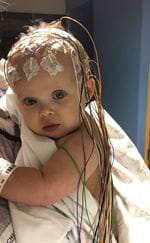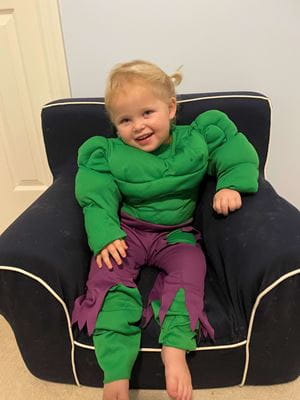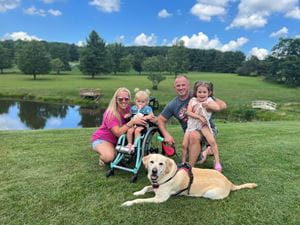Brie was born in March 2020, just as COVID was locking things down in the U.S. Her mom, Tracy, had a normal pregnancy, and Brie hit her milestones regularly, even early, for the first 10 months of her life. But then, says Tracy, Brie seemed drastically different. Her eyes seemed glazed. She had stopped smiling. She was sleeping more and had trouble waking up.
Tracy did a telemedicine visit with the pediatrician, who said they needed to come in immediately.
“I took a picture of her, and you could stare right through her,” she says.
 The pediatrician, who was concerned Brie may be having seizures, which could explain her sleepiness, referred Brie to Child Neurology at UPMC Children’s Hospital of Pittsburgh. At UPMC Children’s they did a rapid brain MRI, and then an overnight EEG to determine whether she was having seizures. She was not.
The pediatrician, who was concerned Brie may be having seizures, which could explain her sleepiness, referred Brie to Child Neurology at UPMC Children’s Hospital of Pittsburgh. At UPMC Children’s they did a rapid brain MRI, and then an overnight EEG to determine whether she was having seizures. She was not.
Tracy says Feb. 13, 2021, is the day everything changed. Brie had another MRI, which showed signs of a leukodystrophy. Leukodystrophies are a group of rare, progressive, metabolic, genetic diseases that affect the brain, spinal cord, and often the peripheral nerves. A group of specialists at Children’s tried to determine whether Brie’s condition could have been caused by something external – was she exposed to anything? Did the Fishers live near chemicals? But the answers were no.
The Fishers – Tracy and Brie’s father, Jon – then met with Uta Lichter, MD, PhD, and Leslie Walsh, MS, MPH, CGC, a genetic counselor, from the Medical Genetics Division. They told the Fishers  the hospital would run rapid genetic testing as part of Brie’s workup. Because they already had Brie’s bloodwork, they only needed to take cheek swabs from Tracy and John. With rapid genetic testing, results would be available in weeks, not months.
the hospital would run rapid genetic testing as part of Brie’s workup. Because they already had Brie’s bloodwork, they only needed to take cheek swabs from Tracy and John. With rapid genetic testing, results would be available in weeks, not months.
“Clinically, she looked fine,” says Tracy, who is a registered nurse, “but you wouldn’t think anything was wrong with her. It didn’t fit what they were telling me.”
Ten days later, on March 1, the Fishers were called to a meeting with Leslie, Dr. Lichter, and Monica Naik, MD, a child neurologist. They’d received the genetic testing results, and they knew what Brie had: Aicardi-Goutieres syndrome (AGS). AGS is a rare neurologic condition that can also affect other body systems. It often progresses rapidly and then plateaus. Development can be typical for some time, then stop or regress.
Despite Brie being significantly motor- and verbally handicapped, specialists say she is classified as having the “mild” form of AGS. Now, at 2-1/2 years old, she has four words: Mommy, daddy, hi, and me. Time will tell if she retains those words or develops more vocabulary.
The Fishers were sent to another children’s hospital that specializes in AGS. At the beginning of their journey, they traveled to that hospital once a month to see a cadre of specialists. Fast forward to now, they go about every three months and, since COVID protocols have eased, their older daughter Hallie, now 4-1/2, can come along. This makes the visits lighter. In time, Tracy says, they’ll be able to go only twice a year.
 Brie also sees a number of specialists at Children’s, including Neurology, Pulmonology, Ophthalmology, Physical Medicine and Rehabilitation, Cardiology, and Audiology. The teams at both hospitals share everything, Tracy says. Together, they are part of Team Brie.
Brie also sees a number of specialists at Children’s, including Neurology, Pulmonology, Ophthalmology, Physical Medicine and Rehabilitation, Cardiology, and Audiology. The teams at both hospitals share everything, Tracy says. Together, they are part of Team Brie.
Tracy says that Leslie wears many hats for them.
“She was my liaison – she was that person who went above and beyond.”
Leslie says, “Since Brie’s diagnosis, I’ve remained a point of contact for the Fisher family. This is a family that has totally embraced me as a resource – which is what we want! Brie’s entire family have become wonderful advocates for her and the entire AGS community.”
Tracy says, “Things were so confusing. Leslie said, ‘We’re here for you, we’ll throw every resource at you. We’ll take care of the medical side. Just be Brie’s mom. Just be Mom.”
Brie’s treatment and results may not be representative of all similar cases.









